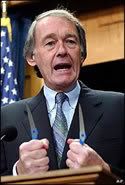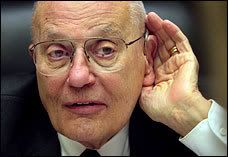The Detroit Free Press reports:
In a victory for Detroit automakers, the main backer in the U.S. House of tougher fuel economy standards said late today that he would not push for his 35 mile-per-gallon standard this week.
The move by Rep. Edward Markey, D-Mass., means automakers and the United Auto Workers now have the August recess to prepare for a larger debate in September, when Rep. John Dingell, D-Mich., plans to address fuel economy rules as part of his work on global warming. It also sidesteps what would have been a bruising floor flight between Markey and Dingell as the House Democrats speed through bills ahead of the August recess.
For the past few weeks, Markey has declined to say whether he would try to attach his plan, which would force the industry to meet an average standard of 35 m.p.g. by 2019, to the energy bill the House is scheduled to consider Friday. Markey said in a statement today that while he believed he had enough votes to move his plan, he would instead back the mileage increase that passed the Senate in June.
That measure, part of a broad energy bill, sets standards of 35 m.p.g. by 2020, and was a significant defeat for the auto industry.
Today's move by Markey suggests that some of the obituaries about the automakers' lobbying power on Capitol Hill were premature.
"I am satisfied that our strength in both the House and the Senate is sufficient to ensure that the progress we have made already to update our fuel economy standards will win out in conference," Markey said. "The country cannot afford to accept less than a 35 m.p.g. standard if we are to wean ourselves off our addiction to imported oil."
Markey's retreat came after weeks of intensive lobbying by Detroit automakers, the UAW, Toyota Motor Co. and dozens of other groups against Markey's plan and for an alternative from Reps. Baron Hill, D-Ind., and Lee Terry, R-Neb. That bill would have required new cars and trucks to meet an average of 32 to 35 m.p.g. by 2022.
The industry has steadily racked up support for the Hill-Terry proposal, adding 141 co-sponsors since it was introduced a few weeks ago. Earlier today, the 47-member Democratic Blue Dog Coalition, a group of conservative Democrats, threw their support behind Hill-Terry.
Automakers maintained the Markey standards are unreachable and would cost thousands of jobs, while environmentalists say the Hill-Terry bill would save far less oil than Markey's plan. Industry executives said they would not push to have the House consider Hill-Terry if Markey's bill didn't make the House floor.
Environmental groups had responded to the automakers' efforts with a lobbying blitz of their own up until the last minute, with 13 state attorneys general weighing in today against the Hill-Terry bill. But those groups had also been preparing for a strategic retreat in recent days.
"If we don't end up with a House provision on Markey, we will have fought the auto industry to a stalemate in the House, and we will win the war in conference," said Daniel Becker, director of the Sierra Club's global warming program.

